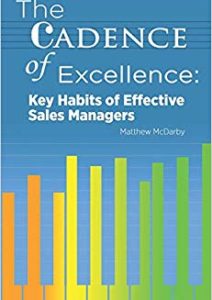If you’re a football fan you might recall, from 1967, that winning touchdown that Vince Lombardi scored against the Dallas Cowboys. Or if you’re a European football fan (known as soccer to us Yanks) you might remember, a few years back, all those goals scored by Sir Alex Ferguson for Manchester United. Or moving over into women’s’ college basketball, how about the points that Pat Summit scored during her incredible time at Tennessee?
You don’t remember any of those?
It could be that I recently stepped into an alternate universe. Over the last few months, while spending time with sales managers, I got the distinct impression that some coaches are throwing aside coaching and, instead, heading out onto the field as players. Have you perhaps witnessed this yourself in your company?
Take a look at the role that you or other sales managers most often play when out in the field with members of the sales team. Is coaching occuring on a regular basis? I’ll be clear about what I mean by coaching:
- Observing team members in action to identify issues with their approach and opportunities for improvement
- Helping them in drawing conclusions about how they can change
- Getting them to willingly commit to some new or different action to get a result you all want. If you or your sales managers are not regularly investing time into coaching, I have another article for you to read in your next spare moment.
A few more questions to consider…
- What form does your coaching take?
- When does it happen and in what context?
- What kind of planning do you engage in before you coach members of your team?
If you and I could somehow ask Pat Summit or Vince Lombardi, Alex Ferguson, or John Wooden these questions, would they struggle to answer those questions about their approach to coaching? Would any professional coach struggle to answer these questions? Probably not. The likes of Summit, Wooden, and Lombardi might even look at us as if we were fools for asking the questions in the first place. Knowing when and how to coach and being prepared with what to coach are essential to great coaching.
Why is it that so many of us in sales management roles give little to no thought about how we will execute as coaches? Furthering that question, why do the fundamental rules of great salesmanship… planning and asking questions with strategic intent, listening and clarifying, seeking clear conclusions and commitments from the other party… seem to go out the window when we move from sales “player” to sales “coach”? Are the differences between great selling and coaching so significant?
THE MILLION $ / £ / € QUESTION: Why do so few sales managers take their craft as coach seriously?
Perhaps it is because they think they can still win the game on their own. Perhaps it is because their employers don’t place proper emphasis on the need and impact of great coaching on sales results. This is one of the most significant perils of hiring great salespeople to be sales managers without preparing them to be great coaches.
What is your organization doing to prepare newly minted sales managers to be great coaches?
This is my stock and trade, so allow me to offer one simple lesson that I’ve taught to hundreds of sales managers over the years. You can teach this same lesson to new sales managers—or learn it yourself—on day one of the new job, and you can fit in on a single slide:
-
Coaching is selling.
-
Excellence requires preparation.
-
We need you to be an excellent coach.
Prepare yourself for a vigorous dialogue with your coaches about the expectations we set with those three simple lines. If you want to know how the rest of that dialogue should go, then you and I should talk sometime.
Pipeliner CRM empowers sales managers to coach with excellence.Get your free trial of Pipeliner CRM now.














Comments